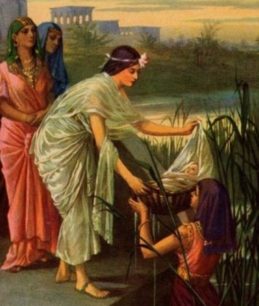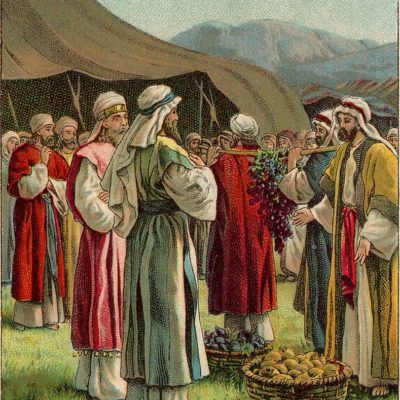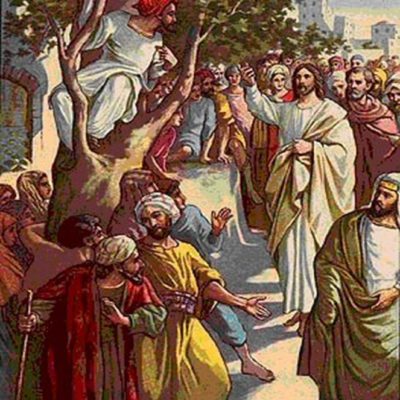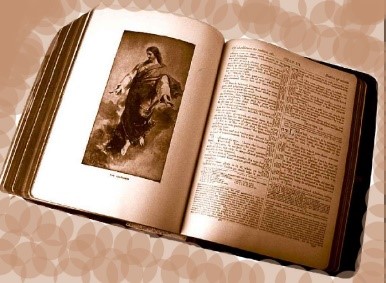Miriam Sister of Aaron and Moses

Miriam was the sister of Aaron and Moses. She played the role of protector, obedient daughter, sister, prophetess and an unhappy leader whose pride got in her way. There is much that can be learned from Miriam. Her mistakes in disrespecting Moses as well as the LORD God can guide us on our journey in life and in our relationship we have with the LORD God.
Exodus 2:1-10; Exodus 15:20-21; Numbers 12:1-15; Numbers 20:1-2
Miriam, whose name means “bitterness,” because at the time of her birth the people of Israel entered the harshest phase of the Egyptian exile. Miriam is best known for her role in the life of Aaron and Moses. She was the older sister of Aaron and Moses. She played an important role in protecting Moses as a baby; she was a prophetess in her own right; Miriam led the women of Israel in a song and dance of celebration after the Pharaoh’s men were drowned in the sea.
Miriam was the daughter of a Levi mother and father living in Egypt. The Levi’s were from the tribe of Levi the third son of Jacob by Leah. They later became the priests. The Pharaoh was afraid of the Hebrew people and ordered every son that was born was to be cast into the river to die. This would have meant that Miriam’s three month old baby brother was doom to die. When the mother made a basket of bulrushes and put the baby in the river it was Miriam who stood off and watched. Once the daughter of Pharaoh came to the river to bather she saw the basket and sent her maid to fetch it. The baby wept and she had compassion on the baby and identified it as being a Hebrew baby. Miriam offered to go get a nurse of the Hebrew women to nurse the baby. The baby grew up being nursed by his own mother, who received a wage for doing so. It was because of the faithfulness and the resourcefulness of Miriam that this baby, called Moses, grew up to be such a powerful righteous man of the LORD God. Exodus 2:1-10.
Miriam was first named in in Exodus 15 and identified as being the sister of Aaron. She was also called a prophetess. It was after the Lord God had parted the Red Sea for His people and all the Egyptian army were drawn. She took a timbrel, a tambourine, and lead all the women to go with her dancing and sing to the LORD, saying; for “He had triumphed gloriously; the horse and his rider hath he thrown into the sea.” Exodus 15: 20-21.
Miriam Song is the most well-known of the songs of redemption used by both Christians and Jews. The Jews use the “Song at the Sea” every day in morning prayers, and publicly read it in the synagogue twice a year: on the seventh day of Passover (the anniversary of the splitting of the sea). “I will sing to the Lord, for he has triumphed gloriously; the horse and his rider he has thrown into the sea. The Lord is my strength and my song, and he has become my salvation; this is my God, and I will praise him, my father’s God, and I will exalt him. The Lord is a man of war; the Lord is his name. Exodus 15: 20-21.
The LORD God had brought His people out of slavery, He gave them His Laws and then He victoriously destroyed the Egyptian army. Miriam led all the women in praise to the LORD God for His victory in their singing and dancing such an expression of joy in worshiping the LORD. This shows the leadership that Miriam as the Children of Israel escaped their captivity.
Rulers in the ancient world led through force of arms and military might. Miriam and Moses and Aaron had a different way of leading their people. Their leadership was conducted by example. They served their people taking their hardship and fears into account rather than ruling by an iron fist. The most important difference was they allowed the LORD God guide them and listened to His direction.
Miriam became unhappy with Moses after they had left Sinai and she challenged his leadership role. The reason for the challenge was because Moses had married an Ethiopian woman. They questioned Moses marriage to the Cushite (Ethiopian or Midianite) woman, not because of any personal rivalry, but because Hebrews condemned marriage with any foreigner.
It really was not the real reason for the dispute that Miriam and Aaron had against Moses. It was more like they were trying to gain support for their role as leaders. They claimed that the LORD had also spoken through them. Miriam wanted to be as important and as powerful a leader as Moses was. Moses was very humble, in fact he was meek above all the men which were upon the face of the earth. (Numbers 12:1-3).
The LORD had had enough and order Moses, Aaron and Miriam to go to the tabernacle of the congregation and He came down in the pillar of the cloud. There He set all three of them straight when He said: “If there be a prophet among you, I the LORD will make myself known unto him in a vision, and will speak unto him in a dream.” The LORD went on to let them know that Moses was faithful in everyone in his house and He speaks mouth to mouth to Moses because he is so faithful. The LORD was really furious with those who spoke against Moses. Moses had the full authority of the LORD GOD; not Miriam. (Numbers 12:4-8).
When the cloud departed from the tabernacle Miriam has become leprous, white as snow. This was obviously a punishment from the LORD God because of her questioning the authority of Moses. It was the dramatic sign that Moses was indeed the chosen leader, chosen by the LORD God.
It was Aaron who spoke to Moses and threw himself at the mercy of Moses to speak to the LORD God and repented of their sins. He begged for the life of Miriam. Moses cried unto the LORD and beseeched Him to heal her.
Numbers 12:15 And Miriam was shut out from the camp seven days: and the people did not journey until Miriam was brought in again. So she was banished for the seven days the people pitched their tents in the wilderness of Hazeroth.
Once Miriam was welcomed back within the tribe, with her brothers Moses and Aaron, she helped to lead the Children of Israel. They wandered for forty years because of disobedience and mistrust in the wilderness. Their life was hard, and they had to resort back to a nomadic life style. Their water was always scarce, the food supply was unreliable, and the physical living conditions were rigorous, demanding, and laborious.
The children of Israel, even the whole congregation, into the desert of Zin in the first month: and the people abode in Kadesh; and Miriam died there, and was buried there. There was no water for the congregation: and they gathered themselves together against Moses and against Aaron. Numbers 20:1-2
Because Moses and Aaron did not believe in the LORD and did not keep the LORD God Holy in the eyes of the children of Israel they would not be able to go with the congregation into the Promised Land the LORD had given them. Like Miriam before them they all died before crossing over to the Promised Land.
Miriam’s life had been one of service and leadership. Water played an important part in the life of Miriam. Water was the symbol of life. Moses was saved from death by being floated in a basket in the water. The parting of the Red Sea represented both life and death in the form of water. Even after her death Miriam was buried in a waterless place in the wilderness of Zin. The LORD God gave abundant water to His people in the form of a spring.
The qualities we can glean from the life of Miriam are a life of courage and resourcefulness when she was placed in dangerous situations. Miriam was loyal to her family in times of crisis and loyal to the Tribe of Israel when they faced hardship. She loved music, dancing even telling stories. She took her responsibility of social leadership seriously and controlled these responsibilities with intelligence and confidence. She is a magnificent model for women of today to follow and emulate.
Cite Article Source
MLA Style Citation:
Holstein, Joanne “Miriam Sister of Aaron and Moses:.” Becker Bible Studies Library Jan 2015.< https://guidedbiblestudies.com/?p=2009,>.
APA Style Citation:
Holstein, Joanne (2015, January) “Miriam Sister of Aaron and Moses:.” Becker Bible Studies Library. Retrieved from https://guidedbiblestudies.com/?p=2009,.
Chicago Style Citation:
Holstein, Joanne (2015) “Miriam Sister of Aaron and Moses:.” Becker Bible Studies Library (January), https://guidedbiblestudies.com/?p=2009, (accessed).


